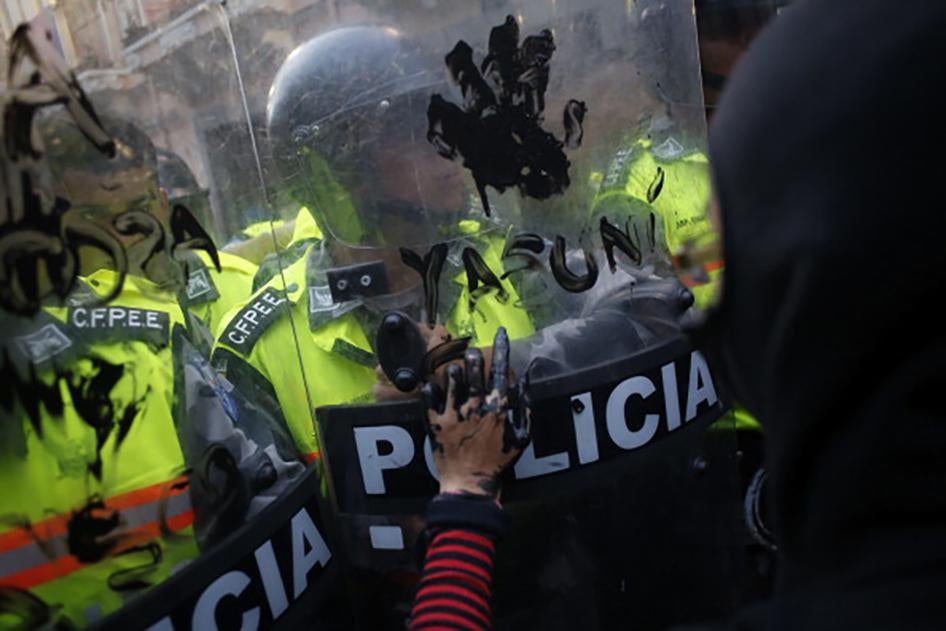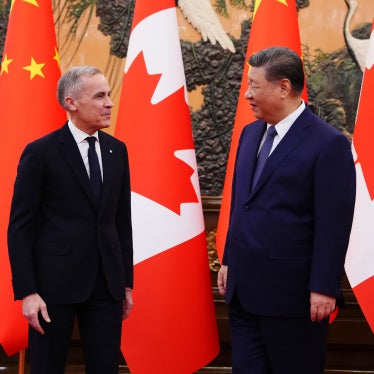During his visit to Ecuador last month, Pope Francis delivered a speech on environmental stewardship and urged the administration of President Rafael Correa to “open spaces for dialogue” on how to manage the country’s resources. The 4,000-square-mile Yasuní National Park is one of the most biodiverse places on the planet but also contains vast untapped oil reserves. Correa assured the pope that he shared the pontiff’s concern for nature but has instead taken aggressive steps to curtail public debate: harassing, intimidating, and punishing environmental activists and indigenous leaders who object to his plans to expand exploitation of the Yasuní’s oil.
When Correa took office in 2007, he announced that Ecuador would impose a permanent ban on oil extraction in a “block” of the Yasuní National Park known as Ishpingo-Tambococha-Tiputini, or the ITT block, but only if the rest of the world helped compensate for the loss in revenue by donating $3.6 billion (that amount is about half of what Ecuador could make from the estimated 800 million barrels of oil in the ITT).
It was a bold—albeit controversial—proposal, and it served to raise awareness within Ecuador and abroad about the vulnerable state of the Ecuadorian Amazon. But it failed to attract the international support Correa sought, raising only around $13 million in pledges. And so, in August 2013, he abruptly announced that he would open the ITT block for oil exploration.
Environmentalists in Ecuador—including many erstwhile Correa supporters—immediately mobilized to protect the park. Calling themselves the “Yasunidos” (a play on Yasuní and the Spanish word for “united”), they organized massive public demonstrations and began collecting signatures for a petition to put oil drilling to a national referendum.
President Correa was ready for them. In June 2013, two months before announcing his decision to drill in Yasuní, he had issued an executive decree that gave his government broad power to control the country’s nongovernmental organizations (NGOs)—including the ability to shut them down if they “move away from the objectives for which [they were] created” or “compromise public peace.”
That same month, his supporters in Ecuador’s Congress had passed a media law granting the government similarly broad powers to regulate and censor the country’s private news outlets, including punishing them for coverage that officials consider to be incomplete, inaccurate, or damaging to their reputations. Whether or not the timing was coincidental, these measures greatly strengthened the administration’s ability to confront those who opposed opening the park for oil drilling.
The administration used its new executive decree on NGOs in December 2013 to shut down one of the country’s most prominent environmental groups, the Pachamama Foundation, which had been active in the Yasunidos campaign and other efforts to preserve the Ecuadorian Amazon. To justify the move, the government pointed to a violent incident several days earlier at a rally hosted by the organization. The protesters mostly yelled at a Belarusian businessman and a Chilean diplomat who were leaving a meeting with government officials about new oil projects in the Amazon. One of the protesters, an indigenous man, hit the diplomat with the flat edge of his spear.
This isolated act could have prompted criminal charges against the spear-wielding protester. Instead, it led to the dissolution of a well-respected NGO that had a long history of advocacy on behalf of indigenous communities and environmental causes. Pachamama was given no advanced notice, no real opportunity to challenge the decision, and no choice but to return the funding it had received from international donors and close down its operations.
In May 2014, Yasunidos submitted a petition to the National Electoral Council (CNE) with 750,000 signatures—25 percent more than required to trigger a referendum. The CNE rejected it, claiming that more than half of the signatures were invalid, for reasons ranging from alleged duplicates to the use of the wrong paper stock.
When a radio journalist, Gonzalo Rosero, speculated on his show that the real reason the national referendum wasn’t happening was that “Correa didn’t want it,” Fernando Alvarado, the communications minister, filed a complaint before the Superintendency of Information and Communication, an agency established by the new media law, that could force the station to issue a retraction or else face a harsh fine.
Rosero had reason to be suspicious of the CNE’s ruling on the validity of those signatures. Although the CNE is ostensibly an autonomous body, its president, Domingo Paredes, a former Correa official, had publicly criticized the Yasunidos campaign before the signatures were reviewed. When Yasunidos questioned the CNE’s ruling, Paredes threatened to press criminal charges against them, claiming they had committed “slander” and had “tried to deceive” public authorities by presenting inadequate signatures. When Yasunidos submitted a petition to the Inter-American Commission on Human Rights challenging the CNE’s decision, Paredes warned that the government would take legal action against the group if it continued what he called its “offensive” against the state.
That warning could not be taken lightly. In recent years, the government has repeatedly prosecuted environmental activists on dubious grounds. In 2013, for example, it obtained sentences against ten people who were organizing a peaceful protest against Correa’s mining policies. They were given a year in prison for “attempted terrorism.”
In April 2014, Javier Ramírez, an environmental activist from Intag, in rural northern Ecuador, was arrested as he headed home from Quito, where he had been invited to meet the interior minister to discuss his community’s objection to a local mining project. Several days earlier, some Intag residents had thrown a rock at engineers attempting to enter the town. At the time of the incident, Ramírez was at home receiving medical treatment for a knee injury, according to multiple witnesses, including the doctor who treated him, but he was accused of participating in the attack and charged with “rebellion,” a crime that under Ecuadorian law carries a heavier sentence than simple assault. In February 2015, after spending ten months in jail as he awaited his trial, he was convicted, sentenced to ten months in prison, but then released since he had already served his time.
When Correa’s critics have taken their cause to the streets, they have been met on multiple occasions with violence. In September 2014, thousands of people marched in Quito to challenge the government’s policies on the environment and other issues. Police responded with brutal force to the largely peaceful gatherings, subjecting dozens of protesters to serious physical abuse, including beatings and electric shocks. In the new round of demonstrations earlier this month, which resulted in clashes between a minority of protesters and police, the police used force indiscriminately, beating demonstrators who multiple witnesses said were unarmed and nonviolent. On both occasions, Correa publicly praised the police’s performance.
The government’s multipronged campaign against dissent has by no means put an end to public criticism of its environmental policies, either in the media or in the streets. But it has deeply shaken Ecuador’s civil society. Local activists, community leaders, and journalists find themselves constantly weighing the risk of retaliation by a government that has proven willing and able to punish them for expressing their views. During a broadcast on state television in December, for instance, Vice President Jorge Glas awarded a prominent environmental activist, Esperanza Martínez, a “prize” for spreading the “worst lie of the year.” Martínez had merely cited, during a televised interview, a piece of research by an Italian geographer who claimed that a road the government was building in Yasuní had a potentially negative environmental impact. In light of the new media law, Glas’ condemnation of Martínez most likely served as a warning to news outlets that they could face sanction if they reported information with which the government disagreed. Several members of civil society told Human Rights Watch, where I work, that they now avoid protests or tone down what they say about the president’s policies in public.
Oil drilling is set to begin in the ITT block of Yasuní in the next several years. But many questions remain regarding that and other unexploited regions of the country’s rainforest. The Correa administration’s authoritarian tactics, which would be unacceptable in any circumstance, are all the more troubling when they curtail open dialogue on what is—as Pope Francis and President Correa himself rightly observed—an issue crucial to humankind’s future: how we balance economic development against protecting the global environment.









